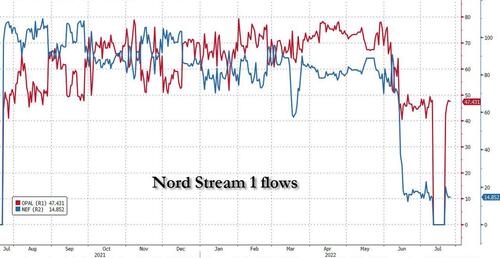EU Countries Reach Agreement On 15% Coordinated Demand Reduction For Next Winter
Following Russian state-owned energy producer Gazprom PJSC’s decision to reduce natural gas flows to Europe via the Nord Stream 1 pipeline, European Union countries agreed on a 15% demand cut through next winter as the probabilities of reaching 80% NatGas storage filling target dwindle, reported Bloomberg.
EU energy ministers convened in Brussels on Tuesday and gave the ‘thumbs up’ to a proposal to voluntarily cut their NatGas demand over the coming months, the Czech presidency of the EU tweeted. Under an emergency, such as Gazprom reducing NatGas flows to zero, the plan states EU countries will have to reduce demand by 15%.
“The EU stands together – agreement on a 15% coordinated demand reduction regulation in only 1 week ! – reducing our gas consumption by 45 bcm is the best move to react to Putin’s gasblackmail – only Hungary voted against,” Luxembourg’s energy minister Claude Turmes tweeted.
The 🇪🇺 stands together – agreement on a 15% coordinated demand reduction regulation in only 1 week ! – reducing our #gas consumption by 45 bcm is the best move to react to Putin’s gasblackmail – only Hungary voted against.
— Claude Turmes (@ClaudeTurmes) July 26, 2022
The news of a coordinated demand reduction plan comes one day after Gazprom said it would reduce Nord Steam 1 pipeline flows to Europe from 40% of capacity to just 20%. On Tuesday, flows dropped to just 38%.
According to Bloomberg energy expert Javier Blas, with “Nord Stream 1 flowing at just 20% of capacity from July 27, Germany will NOT have enough natural gas to make it throughout the whole winter **unless big demand reductions are implemented**. Berlin will need to activate stage 3 of its gas emergency program.”
With Nord Stream 1 flowing at just 20% of capacity from July 27, Germany will NOT have enough natural gas to make it throughout the whole winter **unless big demand reductions are implemented**. Berlin will need to activate stage 3 of its gas emergency program #ONGT #EnergyCrisis
— Javier Blas (@JavierBlas) July 25, 2022
The decline in Nord Stream flows made the probability of EU countries reaching the 80% NatGas storage filling target by winter even more unlikely, implying Europe is facing a freezing winter but also what could be a painful recession.
Sven Giegold, a deputy German economy minister, said the new plan is “an unprecedented step in European solidarity … “EU states that do not import any Russian gas are showing support and have committed to reducing consumption. This has never happened before.”
Bloomberg outlines some EU countries had concerns over the cuts:
In the run-up to the meeting, a number of countries including Italy, Hungary, Poland, Portugal and Spain had raised concerns over the reduction goals, citing demand cuts already achieved, lack of gas connections to other countries and the fact that decisions on energy are usually a national competence.
The Czech Republic, which holds the EU’s rotating presidency, had proposed a number of changes in recent days to the commission’s plan from last week in a bid to bring nations onside.
The revisions included a provision that would increase the number of countries that have to request that a 15% demand-reduction target be made mandatory to five from three, according to a draft seen by Bloomberg. The commission could also propose the emergency measure if it deemed there’s a high risk of a shortage. Both scenarios would also need majority backing from member states to take effect.
Other tweaks included taking into account the level of gas storage in a country as well as the possibility of excluding certain key industries. The rules would also only be set for one year, rather than two as originally outlined. Member states could ask for a lower mandatory reduction under certain criteria based on their interconnections with other nations — island countries like Ireland for instance.
Statista’s Katharina Buchholz details a complete shut-off of Nord Stream would have disastrous effects on European economies.
NatGas is used widely in Europe to supply household heat and hot water. So any forced demand curtailment this winter could leave many people freezing and unhappy.
Tyler Durden
Tue, 07/26/2022 – 08:38

